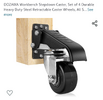Tons of workbench plans out there. You could take your pic and then just add casters to it. Unless you’re looking for something special that would differentiate it from a mobile vs stationary.
Not sure where the pegboard would go, down low / on the sides? You wouldn’t really have that high of a back on a mobile version, would you?
Not sure where the pegboard would go, down low / on the sides? You wouldn’t really have that high of a back on a mobile version, would you?











